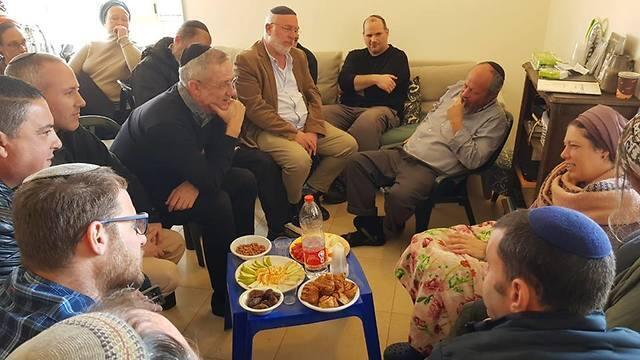Getting your Trinity Audio player ready...
At first glance, it looks impressive. The long line of public officials who came to pay a condolence call and comfort the family of Ori Ansbacher from Tekoa portrayed a feeling of national unity. During their moment of anguish and pain, senior government officials came to empathize with a family that lost their daughter to a cruel killer.
and Twitter
But on second thought, the image is one of fake sympathy. There was something very disturbing in the photos. Would all the party heads have come to pay respects had there not been elections on the horizon? Would they have expressed the same level of empathy if we were not in the midst of an intense elections campaign? I think the answer is no.
When asked, when was the last time Benny Gantz visited a bereaved family who were victims of terror, his strategic adviser could not recall when. The best response he could provide was that Gantz is in constant contact with many bereaved families. That is undoubtedly true, as former IDF chief, Gantz, was the commander of many soldiers who died in the line of duty and he maintains contact with their families. But visits to families of victims of terror were not part of his routine in recent years.
Benjamin Netanyahu led his political adversary into a trap. Netanyahu knows that grieving families enjoy widespread consensus and strike a raw nerve among Israeli society. Not for nothing does he routinely remind the public that he himself lost his brother in battle. His presence at the home of the bereaved family in Tekoa obliged the rest of the political players to do the same, or risk being seen as cold, detached and unpatriotic. And when they do come, they will be accused of cynically using the families’ grief for their own political ends.
2 View gallery


President Rivlin pays condolence call to family of Sgt. Yosef Cohen
(צילום: חיים צח, לע"מ)
Netanyahu regularly pays condolence calls to bereaved families, not just during election season. He is not the first prime minister to do so. One of the more prominent of such visits was that of Ariel Sharon to the family of terror victim Gilad Zar in 2001. Sharon sat in respectful silence as the family poured out their wrath at the prime minister for purportedly not doing enough to prevent their son’s murder.
President Ezer Weizmann was the first president to pay condolence calls to the families of IDF soldiers who died in service. The three subsequent presidents also did the same. But it begs the question: granted, the president and prime minister are symbols of the state, but what do other politicians have to do with such affairs?
The truth is that they have no good reason other than the desire to squeeze another drop of public relations out of the visit. And if they reject the criticism and insist that as public officials they feel an obligation to come and pay their respects, then they should leave the cameras outside.
Politicians live by the rule: if it wasn’t photographed, it didn’t happen. When they visit bereaved families with a line of cameras in tow, they are turning the family into a campaign prop. If they are sincere in their sympathy, they ought to maintain a low profile and leave the cameras outside.


